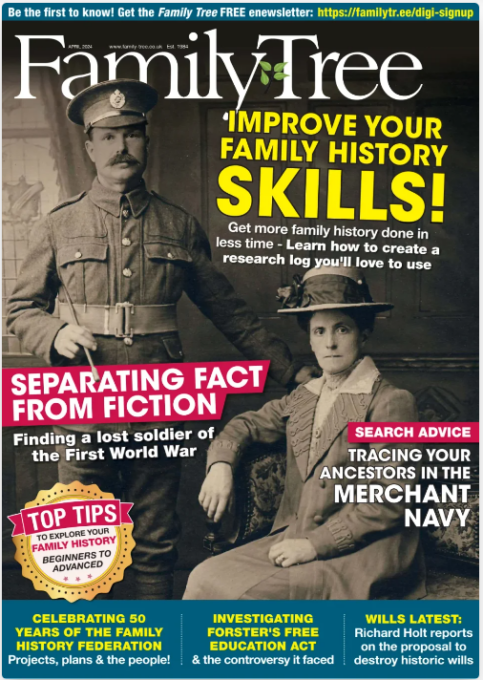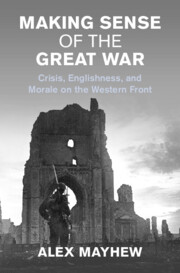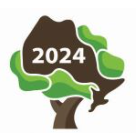Two weeks out weather forecasts are hardly better than speculation. So, for what it’s worth, the probabilities for 8 April from the North American Ensemble Forecast System (NAEFS) are for cloudy skies with the possibility of some precipitation, not a major storm event, for Kingston, which is in the zone of totality.
Family Tree Magazine: April 2024
Here are the contents of this latest issue, plus a couple of comments.
FAMILY HISTORY NEWS
Rachel Bellerby reports on the latest from the genealogy scene.
[It includes that “Sarah Bush, previously chief product officer at FindMyPast, has been named as the genealogy company’s new managing director; as part of closer integration with its parent company, DC Thomson”]
DISCOVER THE POWER OF A RESEARCH LOG
Professional genealogist Dr Sophie Kay explains why a research log is the family historian’s best friend and how to create one you’ll love to use.
[Sophie Kay uses the analogy between a research log and fastening one end of a ball of string at the entrance to a maze and unwinding as you proceed as a way to get out. Your genealogical maze may have more than one entry/exit that opens up the options of different approaches. Perhaps these days, repeating an online search may be more efficient than recording the previous search and searching the log.]
BILL EVERLEY’S WAR
Family Tree reader Mike Everley shares the story of his research into his father’s WW2 Royal Air Force war years
SEPARATING FACT FROM FICTION – IT IS POSSIBLE
Stuart Valentine shows how to separate family tales and documented history to get to the truth of the matter
MAKE DNA DISCOVERIES
Discover the information you dearly seek about DNA at the upcoming DNA Discoveries event
DEAR PAUL
In this month’s genealogy gems, Paul Chiddicks takes a closer look at our ancestors’ last wishes
EDUCATING A NATION
Researcher Gaynor Halliday explores how the passing of the Elementary Education Act of 1870 sparked major disagreements.
[Interesting background]
BOOKS & CO
Rachel Bellerby & Helen Tovey share thoughts on a selection of family-history related reads. They are:
[Uncrowned: royal heirs who didn’t take the throne, by Ashley Mantle.
A Woman’s Will: The changing lives of British women, told through the things they have left
behind, Viki Holton.
From a rock to a hard place: the 1984-85 miners’ strike, by Beverley Trounce.
Family History Research Skills Workbook, by Dr Sophie Kay.
The Heavy Water War: beating Hitler to the bomb, by John Sadler.
Becoming a Historian: An Informal Guide, by Penelope J. Corfield & Tim Hitchcock. Downloadable as a free pdf from https://uolpress.co.uk/book/becoming-a-historian/.
The London Bookshop Affair: A Novel of the Cold War, by Louise Fein.]
RESEARCHING 19TH CENTURY MERCHANT SEAMEN
Family Tree Academy tutor David Annal shares the know-how you need to tackle a perhaps daunting set of historical records
HOW TO PRESERVE YOUR FAMILY HISTORY PHOTOS
Photogenealogist Ann Larkham looks at how to preserve those precious originals
IS THIS ‘BRIDGERTON’ CONTINUED?
Tree-tracing diarist Gill Shaw shares the latest slice of her deliciously entertaining family history research
ACCESS TO WILLS
Professional genealogist Richard Holt, the man behind the petition to #SaveOurWills, shares reflections on the situation so far
CELEBRATING 50 YEARS OF THE FAMILY HISTORY FEDERATION
We shine a spotlight on this remarkable genealogy organisation, going strong since 1974
PHOTO CORNER
Photo-dating expert Jayne Shrimpton helps to date and identify family photos from the past
YOUR QUESTIONS
Experts Dr Sophie Kay & Dr Simon Wills are on hand to help
DIARY DATES
Discover events to look forward to this April: online, in person & hybrid
YOUR LETTERS
Take a look at the heirlooms cherished by readers
THOUGHTS ON …
Diane Lindsay ties up the loose ends on a genealogical mystery and reminds us of the value of remembering
Last Minute: OGS Toronto Branch Meeting
The March Toronto branch meeting will be held on Monday, 25 March at 7:30 pm via Zoom.
Christine Cochran will present Forensic Genealogy: The New Frontier. Forensic genealogy is a new buzzword these days. But what exactly does it mean? How is it applied? Who needs a forensic genealogist and why? This talk will address these questions and provide some real-world examples.
To open the meeting Bonnie Bell will present The Baton and the Little “Black” Box. This tale of a small silver box and a policeman’s baton found amongst Bonnie’s late brother’s effects demonstrates how family history and genealogy are never done.
For more information and to register click here: https://torontofamilyhistory.org/event/forensic-genealogy/
Military Monday
 A new book, Making Sense of the Great War, by Alex Mayhew, explores how soldiers coped with its horrors.
A new book, Making Sense of the Great War, by Alex Mayhew, explores how soldiers coped with its horrors.
He believes that while WWI soldiers had no choice but to live in a state of constant crisis, they didn’t endure the horrors by focusing on them.
Amidst the bleakest of circumstances, they saw their fight as a defence of something invaluable: family, friends, community, nation, and way of life.
Mayhew’s work, based in diaries, isn’t just about past wars. He points out that humans are masters of adaptation. This strength can help survive tough times, but it also highlights why larger, systemic changes (like combating climate change) are so difficult.
Mayhew A. Making Sense of the Great War: Crisis, Englishness, and Morale on the Western Front. Cambridge University Press; 2024.
The above is my TL/DR version. For a longer summary see https://www.lse.ac.uk/research/research-for-the-world/society/the-great-war-crisis
Sunday Sundries
Miscellaneous items I found of interest during the week.
If you enjoyed this, you might also like the Duck Rabbit podcast at https://play.acast.com/s/duck-rabbit/duck-rabbit-relationships.
‘Majority’ of Irish Land Commission records to finally be transferred to National Archives
The Ottawa Public Library Surplus
In 2023 the OPL ran a surplus of $1.87 million, or 3 percent of total expenditures. Those are taxes for services paid for but not received.
Google researchers unveil ‘VLOGGER’, an AI that can bring still photos to life
Also see this. Much like the DeepStory facility that MyHeritage introduced a couple of years ago, it’s creepy!
Oats and oatmeal aren’t bad for you, as some claim
“A grain which in England is generally given to horses, but in Scotland supports the people.” Link.
A giant-sized enigma
April’s BBC History magazine has a short article on what my father’s cousin called “the rude man” when we stopped in to view the hillside calving at Cerne Abbas in Dorset. It reports that the snail shells that make up his white body may have been cut between AD 700 and 1100, which would make it the only known Anglo-Saxon creation of its kind.
Thanks to this week’s contributors: Anonymous, Brenda Turner, Friday’s Family History Finds, Sunday Thompson, susan Mills-Zorzes, Teresa, Unknown.

British History Online
A digital library, British History Online (BHO) offers a vast collection of primary and secondary sources on the history of Britain and Ireland between 1300 and 1800. Over 1,300 volumes of transcribed content, including Close Rolls and State Papers Domestic, are included.
They recently upgraded their website and are addressing issues with subscriptions, logging in, and searching the content. While most content is usually free, while they fix the problem they’ve temporarily lowered the paywall, allowing free access to all their material.
I suggest going to the website at https://www.british-history.ac.uk/, clicking on search, and entering a community name of interest, even a small one. Chances are the hits will be early, before your period of known interest, but you never know.
FindmyPast Weekly Update
 Last week it was Ireland. Now it’s Scotland’s turn to see a massive increase in index records on Findmypast.
Last week it was Ireland. Now it’s Scotland’s turn to see a massive increase in index records on Findmypast.
Scotland, Court & Criminal Database
Over a million indexes to Scottish court database transcriptions are added to the existing collection of records of Scottish prisons, Crown Office Precognitions and High Court Trial Papers.
Crown Office Precognitions are factual statements that have been given by witnesses to both the prosecution and defence before the case goes to trial. If you find someone of interest in the High Court they would have some involvement in some of the most serious crimes such as murder, rape, treason, heresy, counterfeiting and crimes of a sexual nature, although not necessairily as the accused.
The indexes are linked to Scottish Indexes where you can order the full original record containing images of the original documents for a search fee of £20.00.
Scotland, Mental Health Institutions Registers & Admissions
This is an index of admission and register records for Scottish mental health institutions including asylums and poorhouses. This week’s addition is 207,317 index records, from 1858 to 1921.
The index gives first and last name(s), age, birthplace, year, occupation, year and date of admission, death year, death date, patient identification number and institution name.
Like the Court and Criminal database, these indexes are linked to Scottish Indexes.
Scotland, Poor Law & Poor Lists
If your Scottish ancestor received Poor Law relief between 1845 and 1930, their name, age or year of birth, and perhaps relatives (parents or spouse) may appear within these 7,906 index records. Most are for Renfrewshire.
OGS Conference Artificial Intelligence and Genealogy Day
 I don’t often use the word excited. Much of my time compiling the blog is spent toning down what I judge as over-the-top hype.
I don’t often use the word excited. Much of my time compiling the blog is spent toning down what I judge as over-the-top hype.
This time, it does describe how much I’m looking forward to Artificial Intelligence and Genealogy Day, a pre-OGS-conference event on Thursday, 13 June
It’s just announced that Steve Little, AI Program Director for the National Genealogical Society and founder of AI Genealogy Insights, is an added speaker. That’s along with Daniel Horowitz from MyHeritage, a world leader in implementing AI-assisted technologies. They will join Blaine Bettinger and Jonny Perl. If there was a cinema marquee, they’d be crowing out each other for top billing.
Visit the conference website for more information. There will be no onsite registration so be sure to sign up in advance.
Find A Grave update on Ancestry
Ancestry updated their version of Find A Grave on 20 March with over 2.5 million new entries. The US added 1.1 million, the UK and Ireland 563,115 — 2.9 percent more than in December. Canada’s 168,288 additions are an increase of 1.7 percent.
| Area | March 2024 | Dec 2023 |
| Canada | 10,248,891 | 10,080,603 |
| Australia & New Zealand | 11,538,007 | 11,436,526 |
| Mexico | 76,162 | 69,789 |
| Germany | 3,086,376 | 3,017,935 |
| Italy | 353,025 | 343,946 |
| Brazil | 190,802 | 189,211 |
| Global | 16,204,539 | 15,649,165 |
| U.S. | 176,906,048 | 175,802,716 |
| UK & Ireland | 19,905,080 | 19,341,965 |
| Sweden | 1,118,394 | 1,116,071 |
| Norway | 225,419 | 223,985 |
The actual Find A Grave site, where you can search 571,091 cemeteries in 250 different countries, has additional entries.
Scottish Memorial Inscription Database Now on Ancestry
If you have Scottish ancestors, you may be interested in Ancestry’s new “Aberdeen and North-East Scotland, Index to Memorial Inscription Booklets, 1500-2021” database. With 185,928 records, it’s a substantial resource for family history investigation.
This database indexes booklets containing transcriptions of memorial inscriptions (MIs) from cemeteries and churchyards in the region. MIs can provide the following genealogical information:
Full names of the deceased
Dates of birth and death
Family relationships
Occasionally, notes on occupations or places of residence
This is an index. To view the complete inscriptions, you’ll need to locate the original MI booklets. The index was created by the Aberdeen & North-East Scotland Family History Society (ANESFHS) (https://www.anesfhs.org.uk/databanks/memorial-inscriptions/miindex). Most records are in English.
Scottish Indexes Conference
Coming this Saturday, 23 March 2024, the latest Scottish Indexes Conference. The presentations are:
‘Family History and the Clyde’ by Dr. Irene O’Brien, Archivist at Glasgow City Archives
‘Survival Sex, Poverty and Desperation: Prostitution in Aberdeen 1840-1870’ by Dr. Dee Hoole
‘Understanding Scottish Inheritance Records’ by genealogist Chris Paton
‘The John Gray Centre: East Lothian’s Heritage Hub’ by Dr. Hanita Ritchie
‘Making the most of Scottish High Court records’ by genealogist Emma Maxwell
‘Researching Hudson Bay Company Ancestors’ by Christine Woodcock
Scottish Genealogy Q&A hosted by Graham and Emma Maxwell
Each presentation is shown twice, in sessions starting at 7 am and 3 pm UK time, that’s 3 am and 11 am ET.
Find out more, and how to register at https://www.scottishindexes.com/conference.aspx
Genealogy benefits from the Young Canada Works Program
Every year Employment and Social Development Canada fund proposals under the Canada Summer Jobs program in which genealogical organizations participate. Nine organizations have been part in the past two years, four each in Nova Scotia, and Ontario and one in New Brunswick, for a two-year total of $83,583. Most received repeat funding.
| Organization | 2022 & 23 Funding $ |
| Argyle Municipality Historical and Genealogical Society (NS) | 9266 |
| New Brunswick Genealogical Society | 4775 |
| Ontario Genealogical Society, Leeds and Grenville Branch | 9672 |
| Pictou County Genealogy & Heritage Society (NS) | 19487 |
| Shelburne County Archives & Genealogical Society (NS) | 13139 |
| The Ontario Genealogical Society, Essex Branch | 8444 |
| The Ontario Genealogical Society, Huron Branch | 4667 |
| The Ontario Genealogical Society, Kent Branch | 9500 |
| The South Shore Genealogical Society (NS) | 4633 |

